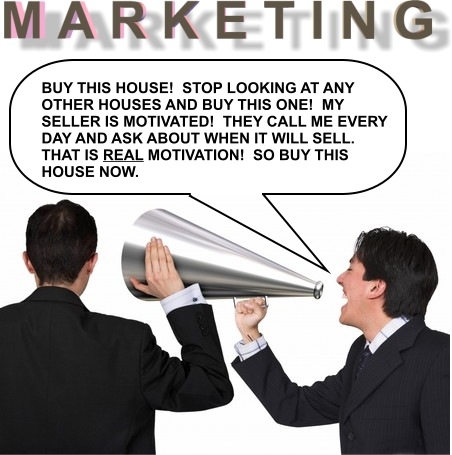The seller has a problem. They have a house they want to sell and need to sell it at a certain price. They hire an agent who takes on the task of selling the home.
"Maybe if you had more open houses?"
"Have you thought about running an ad in the Wall Street Journal?"
"There are a lot of people from California with money because the prices are so high there. Run an ad in the L.A. Times."
"If you go to (large local employer) you can put a notice on their bulletin board about the house."
This is just a partial list. The limits of the list are only the limits of the seller’s imagination. There are hundreds and hundreds of these great ideas for getting the house sold. Sometimes agents try them all (one at a time, of course). Usually, the agent notices that it didn’t work. But for some strange reason this does not prevent the agent from attempting the very same science fair project again at a later time, and surprise: they get the exact same results they did the first time.
Walking through the office about 15 years ago a very nice agent asked me if I would go in with her on running an ad in one of the picture magazines. She didn’t want to buy the whole page herself and was looking for a couple of other agents to put one of their houses in the ad, in order to defray the cost of the ad. I asked her why she was running the ad and her answer was, "To make the seller happy". I asked her if she believed that running an ad in the picture magazine was very likely to sell the house. Her answer was no, she did not think it would even help sell the house. I told her I did not ever run ads on homes because they did not make any difference in getting the home sold. She agreed with me. But she still ran the ad.
It was easier for her to run that ad than it was to tell her seller the truth. My answer to sellers on that issue is, "If an ad in the paper or some magazine was going to sell their home they don’t need an agent. They could just run the ad themselves and save the commission." That’s the truth.
From Anne:
ok, so if I may start my question asking. My goal is to get seller’s to stop getting so addicted to my marketing efforts and more focused on price. I feel my current listing presentation does a pretty good job (although now after star power I’m going to make it even better) as some are well trained while others act like cocaine addicts and can’t get enough of my open houses and are always calling me with new ideas to get "exposure" to their potential buyer and crap like that. Some of them I flat out tell them no and others I feel so sorry for because they are seriously in trouble if they can’t sell financially. How do I handle this? any thoughts?
Yes. Get a subjective reality on what does and does not cause houses to sell. Get rid of all of the little points of "reasonableness" on this subject. The "unsolvable problem" does not exist in the mind of the seller. I do understand that it seems like it does. It exists in your mind. You do not have certainty that what you are doing is enough. There is some nagging doubt that there is "something" you aren’t doing that you "ought to do". This point alone opens the door to all sorts of nonsense (the not very fun kind of nonsense).
If you believed that running those ads or holding those open houses (or whatever "exposure" you or they could dream up) was going to cause the house to sell, you would be doing them. You wouldn’t need any sales pitch or prodding. You would just do them. There are two factors here: what works for you and what you "like" to do. Open houses can work. I don’t like them. Therefore I don’t do them. This is not a statement that others should not do them or that someone who does not know how to correctly hold a house open should not learn how to do it.
I believe that if you re-read the first paragraph after your question and wanted a simple answer to what caused a home to sell (assuming the usual is already being done) you will come to realize what you already know: price.

